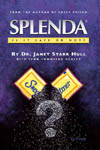
Q: Exposing The Dangers Of Aspartame
How can one persuade people and governments about the evil and danger of aspartame?
A: From Dr. Hull
Sadly, our governments have not done anything about the proven dangers of aspartame, so by now, they are not going to.
The only way these toxic sweeteners will come down is through lawsuits filed by consumers. What most people don’t know is that many lawsuits have been filed, and won, in the past, but these lawsuits have been settled out of court with gag orders as part of the settlements.
All the consumers filing lawsuits WON against Monsanto’s NutraSweet Company.
It sounds harsh, but I actually think that consumers should sue their doctors who plead ignorance or actually defend aspartame use (and vaccines these days) as safe because everyone KNOWS that aspartame is a health danger. Believe me, everyone knows.
Your medical advisor should definitely know the health dangers of aspartame, vaccines, and other toxins that you are exposed to, and if they don’t, then they are not very smart, and I’d change doctors.

This is a perfect example of the politics of greed, and as more and more whistleblowers come into the mainstream, ALL toxic products should eventually be addressed.
Aspartame is a proven health toxin, but if this issue was about vitamin C or a multivitamin, you can bet the FDA and the Big Corps would have it off the market before nightfall.
What does that tell you?????
Q: Sorbitol and Ace-K
What is your view on sorbitol? Is it safe or just as bad as aspartame? And what about acesulfame potassium?
Thank you.

A: From Dr. Hull
I am asked A LOT if the sugar alcohols are safe sweeteners (sorbitol is 1 of 7 sugar alcohols).
Well, I am not a fan of sugar alcohols because they have been extracted from their natural sources. Sugar alcohols are actually made from sugar, but they are not a form of sugar from their start.
Part of their chemical structure 1) resembles sugar and 2) is similar to alcohol – hence, sugar alcohol. To complicate things more, sugar alcohols are neither sugars nor alcohols. They are marketed as a sugar byproduct refined by nature, and not in a lab.
In my opinion, sugar alcohols fall into a “grey area” because they are actually carbohydrates (starches) more than they are sugars. They are typically used cup-for-cup as refined sugar, but each different sugar alcohol varies in sweetness, ranging from half as sweet to as sweet as sugar.
So, this makes them if-y in my book, and whether they are healthy for you depends upon your individual circumstances.
Here’s more detailed information about sorbitol and ace-K.
Sorbitol
Sorbitol is readily converted in the body to fructose and glucose. The problem with this sweetener is it slowly absorbs from the intestines and may produce a laxative or gaseous effect; it can also affect blood sugar levels more than the other sugar alcohols, so it may not be the best choice if you’re diabetic.
Sorbitol is a simple carb that is 60% as sweet as sucrose. Excessive consumption of more than 50 to 80 grams a day may have a laxative effect. It is called a nutritive sweetener because it actually has four calories in every gram, just like table sugar.
Sorbitol is found naturally in fruits and is an ingredient in many sugar-free gums, sugar-free breath mints and dietetic candies.
Did you know that sorbitol is also produced by your body? Too much sorbitol in your cells can cause damage, though. Diabetic retinopathy and neuropathy may be related to too much sorbitol in the cells of the eyes and nerves.
Here is a word of caution if you have IBS or similar health issues: some foods contain sugars that are absorbed slowly, such as fructose in fruit juice and sorbitol in low-calorie sweets. Through a process called osmosis, these unabsorbed sugars hold onto water in the intestines, which sometimes leads to diarrhea.
By reading labels, people with chronic non-infectious diarrhea can easily avoid fruit juice, fructose and sorbitol to see if this eliminates the problem.
So, to answer your question, I wouldn’t use it as my choice. I’d use stevia, raw unprocessed sugar, or no added sugar at all.
Ace-K (acesulfame potassium)

I do not recommend using Ace-K itself as a sweetener because it is manufactured with methylene chloride, a carcinogen. On page 249 in my book Splenda®: Is It Safe Or Not?, I include the FDA report on Ace-K, and write that the methylene chloride is used as a solvent in the initial manufacturing of the sweetener.
I hope this information helps you out.
________________
If you want to learn more about healthy living, contact me at janethull.com. Remember that you are never alone when you are looking for good health!
________________
Disclaimer: This article is for informational purposes only, and is educational in nature. The FDA may not have evaluated some of the statements. This article is not intended to diagnose, treat, cure, or prevent any disease. Please discuss with your own, qualified health care provider before adding supplements or making any changes to your dietary program.
Before taking vitamins, consult your doctor; pre-existing medical conditions or medications you are taking can affect how your body responds to multivitamins.
You have our permission to reprint this article if you attribute us with a live back-link to this article https://janethull.com/